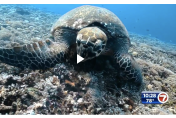05/17/2022
Saving Sea Turtles
FAU Postdoc Works to Conserve Threatened Marine Life
Sean Williamson, Ph.D., grew up in the small coastal town of Kiama in Australia, surfing and enjoying the ocean. But, it was a high school geography teacher that taught him about climate change and after that, “I felt like it would be irresponsible not to work in some way to help address this global emergency,” Williamson said.
In June 2021, Williamson came to FAU to work as a postdoctoral fellow with Jeanette Wyneken, Ph.D., director of FAU’s Marine Science Laboratory and professor of biological sciences in FAU’s Charles E. Schmidt College of Science. His research focuses on increasing our understanding of sea turtles’ lost years, which is the period of life for sea turtles between when they first enter the ocean as a hatchling and when they become resident at feeding grounds as a juvenile. So far, they’ve been releasing two- to three-month-old leatherback turtles, raised at the FAU Marine Lab, into the Gulf Stream with satellite tags.
“The FAU Marine Lab is the only place in the world where endangered leatherback turtles are regularly raised in captivity. They are particularly difficult to maintain in captivity unlike the hard-shelled sea turtle species,” said Williamson. “It's a fantastic place to learn more about their biology and help conserve these ancient and wondrous animals.” He has a few other projects, such as looking at their development in the eggs and how environmental variables affect their growth and fitness.
At FAU, Williamson manages the Glenn W. and Cornelia T. Bailey Marine SEA Scholars, a program that provides financial assistance to students who demonstrate academic excellence and a commitment to become ambassadors of community outreach focused on FAU Marine Research Lab studies and activities. “It's great to be involved and work with a passionate group of students to help educate the public about the awesome research that gets conducted at the FAU Marine Laboratory,” he said.
Before joining FAU, Williamson earned his doctorate degree from Monash University in Australia, researching how sea turtles and crocodiles develop in the egg. He then completed a postdoc, also at Monash, to develop a guide for recreational fishes on safe handling practices of sharks and rays.
In 2018, he began work as a project scientist for Upwell, a nonprofit dedicated to sea turtle conservation. While there, he prepared two leatherback turtle hatchling dispersal field experiments at Pacuare Nature Reserve on the Caribbean coast of Costa Rica. His continuing work with Upwell focuses on building consensus among scientists on efforts to decrease deaths of the East Pacific leatherback sea turtle.
“My research focuses on understanding how animals' function, how that is related to and influenced by their environment, and finally how this information can be used to best conserve biodiversity and help slow the rate of the sixth mass extinction which we are currently causing.”
In his spare time, Williamson said he enjoys practicing yoga, trying to keep his house plants thriving, surfing — when he can in Florida — and going to the odd gig.
All photography courtesy of Sean Williamson.
If you would like more information, please contact us at dorcommunications@fau.edu.
Research in Action with Sean Williamson
1 to 2 p.m. on May 19
Join Williamson as he talks about his research to use vacuum-sealed bags as a novel technique to help protect turtle eggs from dying when moved.



